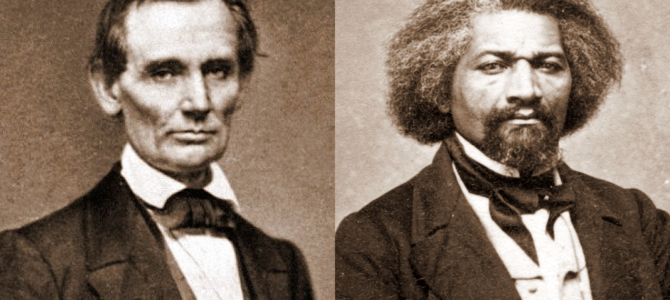
The two men came from extremely modest means, one even more than the other. Primarily because each understood the rare power of self-education and the gift of books, both went on to have lives of remarkable celebrity, accomplishing extraordinary things for our nation.
One was born in a humble one-room cabin in Kentucky. The other was born into slavery in Maryland. In time, they became two of America’s greatest, most consequential leaders during our nation’s most trying time.
Frederick Douglass taught himself how to read, recognizing in his earliest years that education could be “the pathway from slavery to freedom.” He escaped slavery in Maryland at the age of 20, landing as a free man in New York City in 1838 via stops along the Underground Railroad.
A man of great ambition who possessed a moral conviction of steel, Douglass published his “Narrative of the Life of Frederick Douglass: An American Slave” in 1845 and began an antislavery newspaper, The North Star, just a short while later. Within years of winning his freedom, Douglass became arguably the most famous black American in the country.
In the presidential election of 1860, as the Democratic Party was famously pro-slavery, Douglass publicly endorsed the Republican candidate. This candidate, of course, was Abraham Lincoln, who won the White House with less than 40 percent of the popular vote, but successfully earned the majority of Electoral College votes. Writing a month after Lincoln’s election in 1860, Douglass half-heartedly celebrated the would-be Great Emancipator’s victory:
Mr. Lincoln, the Northern Republican candidate, while admitting the right to hold men as slaves in the States already existing, regards such property as peculiar, exceptional, local, generally an evil, and not to be extended beyond the limits of the States where it is established by what is called positive law.
Douglass fell short of calling Lincoln “an Abolition President.” In fact, due to Lincoln’s resistance to dissolving the Union, Douglass referred to the new president rhetorically as “the Abolition movement[’s] … most powerful enemy.” Still, Douglass asked his readers to ponder this larger question for the longer cause:
What, then, has been gained to the anti-slavery cause by the election of Mr. Lincoln? Not much, in itself considered, but very much when viewed in the light of its relations and bearings.
Douglass explained that for 50 years, the “haughty and imperious slave oligarchy” has been the “masters of the Republic,” and their authority “almost undisputed.” But Douglass recognized this was no longer the case. In his essay entitled “The Late Election,” Douglass expressed at length his expectation from this unexpected electoral outcome:
Lincoln’s election has vitiated their authority, and broken their power. It has taught the North its strength, and shown the South its weakness. More important still, it has demonstrated the possibility of electing, if not an Abolitionist, at least an anti-slavery reputation to the Presidency of the United States. The years are few since it was thought possible that the Northern people could be wrought up to the exercise of such startling courage.
Hitherto the threat of disunion has been as potent over the politicians of the North, as the cat-o’-nine-tails is over the backs of the slaves. Mr. Lincoln’s election breaks this enchantment, dispels this terrible nightmare, and awakes the nation to the consciousness of new powers, and the possibility of a higher destiny than the perpetual bondage to an ignoble fear.
Lincoln’s moral outrage toward the institution of slavery was evident. Yet he recognized he was also the president of the nation and his desire to hold the Union together was paramount. When the Civil War began on April 12, 1861, just months into his presidency, Lincoln’s position and responsibility as the nation’s leader brought difficulty to Douglass.
The two men did not have the luxury of addressing the issue of slavery with the same concerns and convictions. They respected one another, but also found themselves separated by significant conflict over such questions as “How could slavery end?” and “What would become of the freed slaves?”
Douglass did confess, years after Lincoln’s death, “His great mission was to accomplish two things: first, to save his country from dismemberment and ruin; and, second, to free his country from the great crime of slavery.” Nonetheless, Douglass publicly paid tribute to the actions of his friend in an essay entitled “Emancipation Proclaimed” in Douglass’s Monthly:
Oh! long enslaved millions, whose cries have so vexed the air and sky, suffer on a few more days in sorrow, the hour of your deliverance draws nigh! Oh! Ye millions of free and loyal men who have earnestly sought to free your bleeding country from the dreadful ravages of revolution and anarchy, lift up now your voices with joy and thanksgiving for with freedom to the slave will come peace and safety to your country.
Douglass gave a famous, national call recruiting “Men of Color, To Arms!” which was published in The New York Times, advocating equal pay and equal treatment for all Union soldiers. He even persuaded his own sons, Charles and Lewis, to join the Fifty-Fourth Massachusetts Infantry Regiment.
On August 10, 1863, Douglass visited his tall friend at the White House to make sure he understood the mistreatments suffered by black soldiers in the battle to preserve the Union. The president permitted him to start a campaign recruiting both black and white soldiers from the South.
As Douglass recounts in his final autobiography, “The Life and Times of Frederick Douglass, From 1817 to 1882,” the pair met again at the White House a year later:
What he said on this day showed a deeper moral conviction against slavery than I had even seen before in anything spoken or written by him. I listened with the deepest interest and profoundest satisfaction, and at his suggestion, agreed to undertake the organizing a band of scouts, composed of coloured men, whose business should be somewhat after the original plan of John Brown, to go into the rebel States, beyond the lines of our armies, and carry the news of emancipation, and urge the slaves to come within our boundaries.
This plan, Douglass explained, was finally unnecessary because of the ultimate emancipation of the slaves. But, he adds, “I refer to this conversation because I think it is evidence conclusive on Mr. Lincoln’s part that the proclamation, so far as least as he was concerned, was not effected merely as a ‘necessity’” but as a moral duty.
In 1865, Douglass traveled to Washington D.C. to hear the president give his second inaugural address. He also accepted President Lincoln’s kind invitation to visit him and his family at the White House, even though the doorkeepers hindered his entrance for a time, noting only his skin color, rather than the distinctive and noble visage of the great man. Once cleared, Douglass recalled their special meeting in his “Life and Times”:
Recognising me, even before I reached him, he exclaimed, so that all around could hear him, ‘Here comes my friend Douglass.’ Taking me by the hand, he said, ‘I am glad to see you. I saw you in the crowd to-day, listening to my inaugural address; how did you like it?’
I said, ‘Mr. Lincoln, I must not detain you with my poor opinion, when there are thousands waiting to shake hands with you.’
‘No, no,’ he said, ‘you must stop a little, Douglass; there is no man in the country whose opinion I value more than yours. I want to know what you think of it?’
I replied, ‘Mr. Lincoln, that was a sacred effort.’
‘I am glad you liked it!’ he said, and I passed on, feeling that any man, however distinguished, might well regard himself honoured by such expressions, from such a man.
Here an escaped slave and the president of the greatest nation on earth talked in the White House as trusted and cherished friends, with the latter telling the former, even as he was almost prohibited from entering that evening, that he is the most esteemed and trusted man in the nation.
When Lincoln was tragically killed less than two months later by an assassin’s bullet, the first lady gave Douglass her husband’s “favorite walking staff” as a reminder of the great support he had given Lincoln during such impossibly trying times.
In his thank-you note to the president’s stricken widow, Douglass told her, “I assure you, that this inestimable memento of his Excellency will be retained in my possession while I live — an object of sacred interest — [and] … an indication of his humane interest in the welfare of my whole race.”
Such was the deep regard between two equally great, but unlikely friends. But Douglass kept a sober view of the difference between them, even as he praised his friend in his oration at the unveiling of Freedmen’s Monument in Lincoln Park on April 14, 1876.
To the crowd assembled that day, Douglass explained, “Abraham Lincoln was not, in the fullest sense of the word, either our man or our model.” He admitted, “Though Mr. Lincoln shared the prejudices of his white fellow-countrymen against the Negro, it is hardly necessary to say that in his heart of hearts he loathed and hated slavery.”
He continued, “He was ready and willing at any time during the first years of his administration to deny, postpone, and sacrifice the rights of humanity in the colored people to promote the welfare of the white people of this country.” This was true, even as “He came into the Presidential chair upon one principle alone, namely, opposition to the extension of slavery.”
But Douglass wanted the Ages to know and remember that the Freedman’s Monument — funded primarily by the sweat of emancipated slaves — was a humble and essential gift to the memory of his friend lost to an assassin’s bullet. That “pure act of malice” had “done good after all.”
For that dark murder “filled the country with a deeper abhorrence of slavery and a deeper love for the great liberator.” As he closed, the ex-slave said, “No man who knew Abraham Lincoln could hate him.”









